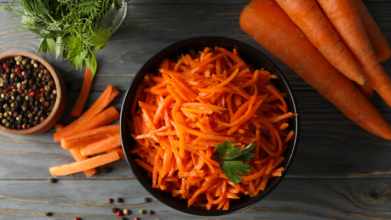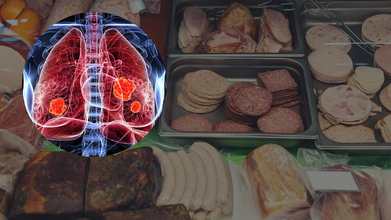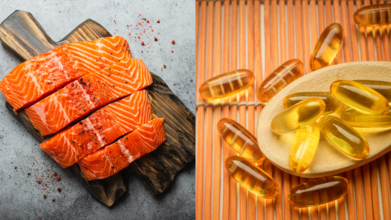- Health Conditions A-Z
- Health & Wellness
- Nutrition
- Fitness
- Health News
- Ayurveda
- Videos
- Medicine A-Z
- Parenting
- Web Stories
Can Vitamin A Treat Measles?

Credits: Canva
The United States is currently experiencing a significant measles outbreak, affecting over 220 people across 12 states as of March 7. One confirmed death and another under investigation have raised concerns, particularly in areas like western Texas and New Mexico, where the rise in cases has been most concentrated. Additional cases have been reported in California, New York, and Maryland. The Centers for Disease Control and Prevention (CDC) has urged travelers to be cautious as spring break begins.
Measles is generally considered a well-controlled infectious disease, with only occasional surges. The U.S. has witnessed two major outbreaks in the last few decades: the Minnesota outbreak of 2017 and the Indiana outbreak of 2005, both attributed to under vaccination.
Can Vitamin A Help Prevent or Treat Measles?
Some public figures, including U.S. Secretary of Health and Human Services Robert F. Kennedy Jr., have suggested that vitamin A supplements, along with certain medications, may aid in treating measles. However, experts clarify that while vitamin A plays a role in immune function, it does not prevent measles infection.
Dr. Danelle Fisher, a board-certified pediatrician, explains that measles can cause vitamin A deficiency, which may worsen symptoms. Supplementing with vitamin A in such cases can be beneficial but does not offer protection against the virus itself. Dr. Monica Gandhi, an infectious disease specialist, cites a Cochrane review supporting the use of two doses of vitamin A in children under two years old with severe measles. The World Health Organization (WHO) also recommends vitamin A supplementation for those infected with measles.
How to Protect Yourself Against Measles
Experts agree that vaccination remains the most effective defense against measles.
“Vitamin A is used when a patient already has measles; it is not a preventive measure,” says Gandhi. “There is no need to take vitamin A supplements in a country like the U.S., where people generally get enough from their diet.”
The best way to protect yourself is to ensure you are vaccinated. This is especially crucial for people in outbreak zones such as western Texas and New Mexico. Parents are advised to get their children vaccinated, as measles can cause severe complications in young children.
Vitamin A and Cod Liver Oil: What You Should Know
Cod liver oil is often mentioned in discussions about vitamin A. While it contains high amounts of vitamin A and vitamin D, excessive intake can lead to toxicity.
“Since vitamin A is fat-soluble, it accumulates in the body if too much is ingested, leading to harmful effects,” explains Fisher.
Most people get enough vitamin A through their diet, but certain groups—such as premature infants or individuals with conditions like celiac or Crohn’s disease—may require supplementation.
How Much Vitamin A Is Too Much?
Consuming excessive vitamin A can be dangerous.
“High doses of vitamin A can cause toxicity, leading to symptoms like nausea, diarrhea, rash, blurred vision, and muscle weakness,” warns Fisher.
For adults, the recommended daily intake is 700 mcg for women and 900 mcg for men. The upper limit is 3,000 mcg for adults, with lower limits for children.
Current Measles Vaccine Recommendations
To curb the outbreak, health authorities recommend the following vaccination schedule:
- Children: First dose of the MMR (Measles, Mumps, Rubella) vaccine at 12-15 months, second dose at 4-6 years.
- Unvaccinated older children, teens, and adults: One to two doses of the MMR vaccine, spaced at least 28 days apart.
- If you are unsure about your vaccination status, consult your doctor to ensure you are protected against measles.
'Eat Your Skin Care' What This Online Trend Really Mean

Credits: Canva
It started with a simple TikTok video, four large carrots shaved into ribbons, mixed with garlic, sesame oil, lime juice, coconut aminos, rice vinegar, and green onions. The resulting “crunchy and addictive” salad quickly racked up millions of views under the viral trend #EatYourRetinol. But is it just social media hype, or can what’s on your plate really show up on your face?
The trend encourages eating vitamin A-rich foods, like carrots, to support skin health from the inside out. “Skincare always starts within,” says Johanna Salazar, registered dietitian nutritionist and founder of Healing Nutrition, as noted by Martha Stewart. But experts urge a balanced view: while diet can support your skin, it’s not a magic replacement for topical care.
What’s in the Carrot Salad That’s Good for Your Skin?
The base of the salad, carrots, are packed with beta-carotene, a precursor to vitamin A, known for boosting skin cell turnover and promoting a radiant complexion. Pairing it with a fat, like sesame oil, helps your body absorb the fat-soluble vitamin. Lime juice adds vitamin C, key for collagen production, while garlic and green onion offer prebiotics that support gut health, which in turn impacts skin health.
Sesame seeds sprinkled on top bring in vitamin E and fiber, which contribute to skin hydration and a healthy glow.
“It’s a nice mix of ingredients that all play small but beneficial roles in skin support,” says Salazar.
Dermatologists Weigh In: Not a Cure-All
Lauren Kole, M.D., associate professor of dermatology at the University of Alabama at Birmingham, appreciates the effort to eat for skin health—but with a word of caution.
“Deficiencies in certain vitamins and minerals can negatively affect the hair, skin, and nails,” she says. “But eating an excess doesn’t necessarily make your skin better.”
Kole points out that while beta-carotene from carrots is helpful, it's not strong enough to replace prescription retinol or other topical treatments for conditions like acne or hyperpigmentation. “Diet is not a substitute for proper skin care,” she emphasizes.
Beyond Carrots: Other Skin-Loving Foods
Experts agree that eating for your skin isn’t just about one salad. A variety of fruits, vegetables, and healthy fats are essential. Salazar and Kole both recommend incorporating:
Dark-colored fruits like berries and red grapes, which are high in antioxidants that fight oxidative skin damage.
Leafy greens such as spinach, kale, and chard, which are rich in vitamin C and help with collagen production.
Vegetables like broccoli, mushrooms, and cauliflower, which support healthy pigmentation and skin repair.
Healthy fats including avocados, walnuts, flaxseeds, and omega-3-rich foods to reduce inflammation and maintain skin moisture.
According to Kole, diets like the Mediterranean diet—rich in plant-based foods and good fats, have shown potential skin benefits in clinical settings.
Don’t Ditch Your Skincare Just Yet
While the “Eat Your Retinol” movement has its heart in the right place, Salazar and Kole stress that no food trend should replace professional skincare or personalized advice.
Lizzy Davis, Ph.D., a dietitian and assistant professor at UAB, advises people to approach such trends with balance.
“Cooking carrots, for example, doesn’t reduce their skin-friendly fiber,” she notes. “It can actually make them easier to digest and still beneficial.”
Davis also warns against over-relying on TikTok or Instagram for skincare advice. “Talk to your doctor or a registered dietitian,” she says. “Social media is convenient, but it can’t give you a plan tailored to your needs.”
Not Just Cigarettes, But Your Food Too Could Increase Your Chance Of Lung Cancer

Credits: Canva
We already know that ultraprocessed foods are linked to obesity, heart disease, and diabetes. But now, a new study published in the medical journal Thorax suggests a concerning addition to that list, lung cancer.
According to researchers, people who consume the highest amounts of ultraprocessed foods may face a 41% higher risk of being diagnosed with lung cancer, compared to those who eat the least, even when accounting for smoking and other known risk factors.
What Are Ultraprocessed Foods?
Ultraprocessed foods are industrial formulations made largely or entirely from substances not typically used in home cooking.
According to the Food and Agriculture Organization of the United Nations, these include artificial colorings, preservatives, emulsifiers, and chemically altered fats, sugars, or salts.
Common examples? Think sodas, chips, packaged soups, processed meats like chicken nuggets and cold cuts, instant noodles, diet soft drinks, and even some ice creams.
These additives enhance taste, shelf-life, and appearance, but at what cost?
What Does The Study Reveal About Food Choices and Lung Cancer Risk
Researchers behind the Thorax study analyzed data from over 100,000 adults who participated in the U.S. National Health and Nutrition Examination Survey. Each person filled out a detailed dietary questionnaire, which researchers then compared with medical records to track lung cancer diagnoses over time.
On average, people reported eating nearly three servings of ultraprocessed food a day, most commonly lunch meats and soft drinks.
Despite adjusting for smoking habits, age, sex, and other lifestyle factors, the study found a clear association between higher ultraprocessed food intake and increased lung cancer risk, particularly among people who had never smoked.
“This strongly suggests that these foods may contribute to lung cancer risk in ways beyond just smoking,” said Dr. David Katz, a specialist in preventive and lifestyle medicine and founder of the nonprofit True Health Initiative, as reported by CNN. Though not involved in the study, Katz called the findings “concerning and credible.”
Why Would Food Be Linked to Lung Cancer?
Experts believe multiple mechanisms could be behind the link.
“Industrial processing alters the food matrix,” the study authors explained, “which affects how nutrients are absorbed and may produce harmful contaminants.”
One such contaminant is acrolein. It is a toxic compound found not only in cigarette smoke, but also produced when cooking oils or fats are heated to high temperatures.
The U.S. Centers for Disease Control and Prevention (CDC) lists acrolein as a substance that can inflame and damage lung tissue.
Packaging may also be a problem. Plastics and synthetic materials used in food storage can leach chemicals, some of which are known or suspected carcinogens.
Add to that the fact that ultraprocessed foods are often low in omega-3 fatty acids, said Dr. Tom Brenna, professor of nutrition and chemistry at the University of Texas at Austin, as reported by CNN.
“Omega-3s spoil easily, so manufacturers tend to remove them to increase shelf life,” he explained. That’s unfortunate, because omega-3s help reduce inflammation, a key process in cancer development.
Smoking Isn’t the Only Risk Factor
Lung cancer remains one of the most commonly diagnosed cancers globally, with 2.4 million new cases in 2022, according to the World Health Organization. While smoking remains the leading risk factor, experts now believe diet and environmental exposures also play a role.
Dr. Fang Fang Zhang, a professor at Tufts University’s Friedman School of Nutrition Science and Policy, as reported by CNN, noted that while the study adjusted for smoking, the adjustment may not have been thorough enough. “Smoking needs to be measured more precisely, by cigarettes per day or years of exposure,” she said. Still, she found the link stronger in non-smokers, which makes the data all the more compelling.
What You Can Do: Eat More Whole Foods
The takeaway? While more research is needed to understand the exact biological mechanisms at play, the connection between ultraprocessed foods and cancer risk can no longer be ignored.
According to Dr. Katz, the solution lies in going back to basics. “Health and diet quality improve when people eat mostly whole, unprocessed foods,” he said, including vegetables, fruits, beans, whole grains, nuts, seeds, and other plant-based ingredients.
Dr. Zhang agrees. “Avoid foods with long ingredient lists full of unfamiliar chemicals,” she advised. “Focus on meals made from whole or minimally processed ingredients whenever possible.”
From PMS to Postpartum, Heart to Hormones: Why Fish Oil is the Ultimate Health Elixir for Every Woman at Every Stage

Fish oil is a star supplement loaded with omega-3 fatty acids like EPA and DHA. It offers a spectrum of vital benefits for women’s health. These extend beyond general well-being to support heart, brain and joint function, especially in areas of concern specific to women.
Fish oil, rich in omega-3s, addresses unique needs across all stages of a woman’s life. From adolescence through motherhood to menopause, fish oil supports cardiovascular, hormonal, mental and reproductive health.
A Boost for the Heart
Fish oil plays a major role in promoting heart health. According to Dr Mohit Bhatia, it helps lower triglyceride levels, a risk factor for cardiovascular disease, and improves blood flow, making it essential for proper cardiovascular function. He adds that it also slows the progression of cardiovascular disease.
Karan Khurana, a health expert at WishNew Wellness, concurs, saying that omega-3s in fish oil reduce triglycerides, lower blood pressure, and decrease arterial inflammation. This is particularly vital for post-menopausal women, who face a greater risk of heart disease. Regular consumption of fish oil, he says, can even lower the risk of heart attacks and strokes.
Hormones, Menstrual Cycles and PMS
Women facing bloating, mood swings or cramps may find some relief with fish oil. Dr Bhatia says that some evidence-based research suggests fish oil can help alleviate PMS and menstrual pain, thanks to its anti-inflammatory properties.
Khurana elaborates that omega-3s may regulate menstrual cycles and reduce cramps by lowering prostaglandin levels, which contribute to pain and inflammation. He adds that fish oil can ease common PMS symptoms such as bloating and breast tenderness.
Pregnancy, Postpartum and a Baby’s Brain
The benefits of fish oil carry into pregnancy too. Dr Bhatia points out the importance of DHA during this stage, saying it is vital for healthy foetal brain and eye development. It may also reduce the risk of preterm birth and help alleviate postpartum depression.
Khurana backs this up, pointing out that fish oil supplementation not only supports cognitive function in babies but also helps mothers manage postpartum depression. It plays a role in maintaining the mother’s brain health during and after pregnancy.
Bones, Joints and the Menopause Years
Post-menopause, bone health becomes a serious concern for many women. Dr Bhatia says that the anti-inflammatory properties of fish oil can contribute to bone health, potentially reducing the risk of osteoporosis.
Khurana adds that omega-3s enhance calcium absorption and support bone density. Fish oil, he explains, helps reduce inflammation linked to joint pain, promoting stronger bones and better mobility for older women.
Better Moods and Sharper Minds
Women are more likely than men to experience anxiety and depression, and fish oil might just help. Dr Bhatia explains that these fatty acids play a role in elevating mood and supporting brain function, potentially mitigating cognitive decline.
Khurana agrees, saying omega-3s support cognitive health and reduce the risk of dementia later in life. Fish oil, he says, may alleviate symptoms of depression and anxiety, contributing to overall mental well-being.
Your Skin Will Thank You Too
Dr Bhatia does not touch on it, but Khurana dives into skin benefits. He says that fish oil improves hydration, reduces wrinkles, and protects against UV damage. Its anti-inflammatory effects can ease conditions like eczema, making skin look and feel healthier.
Final Thoughts Before You Pop That Capsule
Dr Bhatia emphasises that while fish oil is a powerful supplement, it should complement a balanced diet and healthy lifestyle. He strongly recommends consulting a healthcare professional before starting, especially for those on medication or with existing conditions.
Khurana suggests aiming for 250–500 mg of combined EPA and DHA daily, either through fatty fish like salmon or through supplements. Fish oil, he concludes, is a holistic powerhouse that can help women thrive at every stage of life.
© 2024 Bennett, Coleman & Company Limited

